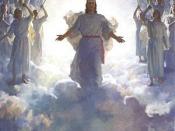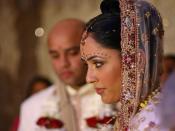The ritual of marriage is significant in the Hindu and Catholic religions. Hinduism is based on achieving liberation from rebirth as an ongoing struggle by fulfilling one's dharma according to the class in the caste system which one belongs to. In contrast, Catholicism is based on the interpretation of the Word of God in the form of tradition. Through shared elements in weddings such as the importance of marriage, the involvement of the witness, the significance of the groom clasping the bride's hand, the exchange of vows and the underlying meaning of the symbol of marriage, one can argue that the theology of Hinduism and Catholicism are revealed.
In the Hindu and Catholic traditions there are different perspectives concerning the importance of marriage. Hindu marriages are greatly rooted in the nature of man. Vasudha Narayanan states, "A man has an obligation in life to marry, raise children [especially sons], and fulfill his debts to his community" (90).
Thus, marriage becomes a responsibility, as producing sons in order to preserve the family line and culture, is highly regarded in Hinduism. In order for a male to fulfill his dharma and escape suffering from rebirth, he should attain the three major religious paths which are karma-marga, jnana-marga, and bhakti-marga (Bhogal: Hinduism II). Through performing rituals, priestly teachings, gaining knowledge from the Upanishads and expressing devotion to a god, the aim is moksha, liberation from suffering. Through marriage a man can achieve his dharma and fully perform his religious obligations (Narayanan 90). Hence, a man without a wife is unable to perform his duties and thus a man is simply a half, who must be completed by a woman. According to Vasudha Narayanan, marrying women in one's own class is important, thus acceptable if the male partner is a higher class (48).



Hindus, eh?
The marriage business in Hindu and Catolicism is very interesting ;)
Personally enjoyed reading this. Although I heard Arranged Marriage comes into this as well?
0 out of 0 people found this comment useful.